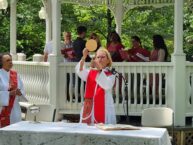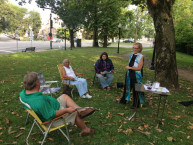 December 13, 2015: May God’s words alone be spoken, may God’s words alone be heard. Amen.
December 13, 2015: May God’s words alone be spoken, may God’s words alone be heard. Amen.
“You brood of vipers!” It seems John the Baptist was one cranky guy…not to mention really weird. Not for nothing, but something tells me that starting sermons this way would NOT work very well for anyone not wearing camel hair suits and eating locusts. As one commentator noted, “that book, The Inspiration Bible…well, this passage didn’t make it….but the prophets in the bible do get all the best lines.”[1] Remember that kids for next week’s Christmas Pageant!
But prophets are also the ones telling people things they don’t usually want to hear. John’s prophetic message not only made some shift in their sandles, but is intended to scare the crap out of them. In John’s day it was people who who had more than they needed while others sufferered, tax collectors who demanded more than what was required, soldiers who terrorized the people and extorted money.
And yet, John the Baptist is claiming to be preaching the good news. I don’t think the folks standing on the banks of the river that day were all that thrilled to be called a bunch of venemous snakes. Where the heck is the good news in that?
The answer is…everywhere – and that was John’s point. Because the answer is all around us – we need only to look beyond our own fear.
When they ask him what is it they need to do, John doesn’t tell them they have to join a religious order, fast, give away all they have, or any other thing we might consider extraordinary acts of piety. He simply tells them to share in their excess, and to be fair in their dealings with others. Essentially to be compassionate, just, and unselfish. Kinda like what we learned in Kindergarten, right? Be nice, play fair, and share. In his book All I Really Need To Know I Learned In Kindergarten” Robert Fulghum writes: “These are the things I learned (in Kindergarten):
- Share everything.
- Play fair.
- Don’t hit people.
- Put things back where you found them.
- CLEAN UP YOUR OWN MESS.
- Don’t take things that aren’t yours.
- Say you’re SORRY when you HURT somebody.
- Wash your hands before you eat.
- Flush.
- Warm cookies and cold milk are good for you.
- Live a balanced life – learn some and drink some and draw some and paint some and sing and dance and play and work everyday some.
- Take a nap every afternoon.
- When you go out into the world, watch out for traffic, hold hands, and stick together.
- Be aware of wonder. Remember the little seed in the Styrofoam cup: The roots go down and the plant goes up and nobody really knows how or why, but we are all like that.
- Goldfish and hamster and white mice and even the little seed in the Styrofoam cup – they all die. So do we.
- And then remember the Dick-and-Jane books and the first word you learned – the biggest word of all – LOOK.”
I guess it is true that all we ever need to know we learned when we were young. When we get older, we make it all so complicated. But maybe if we remembered what it was like to be a kid – fearless – believing that with a cape we could do anything – well, maybe we could! Maybe that is why Jesus was always reminding us that children are the closest to the kin-dom of God.
What keeps us from doing that? Fear. Fear that we won’t have enough (or perhaps that others will have more), so we amass far more than we need. Fear that we aren’t good enough, so we try to make others feel less than. Fear of what we don’t understand, so we try to eliminate that from our view. It is all about fear. John is telling those folks on the banks, and all of us today, that we must let go of that fear, and that the way to do it is to let go, and let God. It is not unlike the words of another prophet, Isaiah, that we heard this morning, who said “Surely, it is God who saves me; I will trust in [God] and not be afraid.” If we can do that, then perhaps the words of St. Paul in the epistle this morning will really mean something. He wrote “Rejoice. Let your gentleness be known to everyone. The Lord is near.” Even the prophet Zephaniah that we heard today is claiming it – “”The LORD, your God, is in your midst” Apparently those who decide on our lectionary wanted to slap us upside the head with something.
All of these prophetic voices are telling us that God is here with us – always near – and always coming to us, that we have nothing to fear. But, the thing is, we often don’t act like it. So often we say that it would be nice if the spirit of Christmas was an all the year through type of feeling. Well, it can be, but it is up to each of us to make that happen, and it doesn’t take much to bring it about either. Just that we act like God is standing beside us…because – well, God is!
How would that change you to think about God in that very real sense of being next to you all the time? No, I don’t mean in a creepy stalker sort of way, but that God’s love was never ending – right there for you to claim always? Because I think it would change the world – one person at a time – as we each let go of the fear that binds us.
You see, “God is changing the broken reality of the world by changing people”…who then change the world. Jesus, the one whose birth we await, the one whom John the Baptist was preparing the world for, gave to us a model of love that we are called to live out every day. And this world needs us to step up now, more than ever – to be extraordinary through our ordinary acts – because today we have more than our own share of snakes among us.
Today, the brood of vipers are the politicians who use fear to get votes, terrorists who use fear to advance their cause, bullies in school who use fear to intimidate and make themselves feel better at the cost of another, religious organizations who use fear to marginalize, anyone in power who uses fear to keep others oppressed.
How is the fear they try to spread different than what our prophet John was doing? While both preach fear, John preaches fear…not of others, but of ourselves – our own actions, and the way we instill fear in others, rather than love. John is saying that those who would spread fear are the ones who should be most afraid, for they are the ones whose souls have gone dark.
What has this to do with us? Isn’t it enough to just be fair, love people, and share what we have? Isn’t that what John is saying? Yes, but only as the foundation for our lives as a people of God – to prepare to let God in our hearts. But we must do more. We also have to be prophets like John. It is not enough for us to do the right thing in our own actions, but we must also stand up against those who, out of their own fear, do all they can to infect the rest of the world – to create a never ending dark night of the soul. Because our voice, our ordinary voice, can do extraordinary things, and our silence can be deadly – to us, and to all of God’s creation.
“Martin Niemöller, [who lived from] 1892–1984, was a prominent Protestant pastor who emerged as an outspoken public foe of Adolf Hitler and spent the last seven years of Nazi rule in concentration camps. Niemöller is perhaps best remembered”[2] [for this prophetic witness, that came out of his own initial silence in the face of vipers]:
First they came for the Socialists, and I did not speak out— Because I was not a Socialist.
Then they came for the Trade Unionists, and I did not speak out—
Because I was not a Trade Unionist.
Then they came for the Jews, and I did not speak out—
Because I was not a Jew.
Then they came for me—and there was no one left to speak for me.
Many of us would like to say “I would never have done that! I would have said something, fought, anything – but I would never have been silent.”
I am reminded of a story I heard about Nikita Khrushchev, the former leader of what was then the Soviet Union. “Khrushchev denounced many of the policies and atrocities of Joseph Stalin. Once, as he censured Stalin in a public meeting, Khrushchev was interrupted by a shout from a heckler in the audience. “You were one of Stalin’s colleagues. Why didn’t you stop him?” “Who said that?” roared Khrushchev. An agonizing silence followed as nobody in the room dared move a muscle. Then Khrushchev replied quietly, “Now you know why.”[3]
If we are honest with ourselves, we understand that fear of speaking out. It can often envelop us until we stand silent…and we do nothing because of fear, or perhaps because of ignorance. But if we do nothing, we may one day be forced to echo Niemöller’s words, in this way:
First they came for the Gays, and I did not speak out— Because I was not Gay.
Then they came for the Immigrants, and I did not speak out—
Because I was not an Immigrant.
Then they came for the Muslims, and I did not speak out—
Because I was not a Muslim.
Then they came for me—and there was no one left to speak for me.
In our silence…in our inaction…we commit spiritual suicide, and we are complicit with the vipers in our midst. It is at these critical moments when we most need to ask what those people asked of John so long ago “What then should we do?”
And if we listen, really listen, we will hear God – the God in our midst, the Christ in our hearts, telling us “Do not be afraid – go!” “Go into the world to speak of justice, and I will be there with you – giving you strength to stand up to power!” “Go out on the streets and spread a message of love, and I will be there with you – helping you know what to say!” “Go to the lost, the lonely, the forgotten, the marginalized, the poor – go to them, and I will be there with you – guiding you in what to do!” But Go! Speak! Do!
We cannot just come here, relying on some sort of personal salvation to be enough. It isn’t enough; it is a start, a first step in a journey of life with God, but not the journey itself. Anymore than being a descendant of Abraham was considered enough in John’s eyes for the people he was speaking to.
In this time of Advent most of all, we remember that God chose to dwell among us, and is in our midst still. And if God did that, “if God deigns to enter into this world, to live among us, to walk with us now, than all of this world is sacred, is holy ground.”[4] And one cannot stand on holy ground and not be moved to act when others would descrate it with hate born of fear. We must act!
But how? How do we start? Where do we begin to be a people capable of acts of couragous love in a world of hate and fear?
It doesn’t begin with heroics, but with our ordinary selves – being compassionate, kind, and just in what we say and do every day – at home, at work, and at play. It isn’t heroic in the comic book sense, but in a very real way, it is the most heroic thing you can do…to live with the heart and mind of Christ.
And it also begins with coming here, to be strengthened in Christ, to be reminded of just how extraordinary our ordinary acts are in bringing about the kin-dom of God in a world desperately in need.
If we do these things, these ordinary acts of love and worship, it will be impossible for us to not then step outside these walls, and together with Christ, be the prophetic voices of love and light that drown out the vipers spreading fear and darkness. Because this love thing? This grace of God – it is infectious, and far more potent than any hate being spewed by the likes of ISIS, Trump, or any other voice of hate.
God is calling each of us to be what we were created to be – ordinary people capable of extraordinary things!
This Advent, as we prepare ourselves for the very small baby who changed the world may we consider the small ways we can change our lives.
May we open our hearts to see the God that is here with us now, as we await God’s presence with us at Christmas.
And may “the peace of God, which surpasses all understanding, […] guard [our] hearts and [our] minds in Christ Jesus,” that we, those wonderfully ordinary children of a most extraordinary God, may be bearers of love, voices for justice, and workers for peace. Amen.
For the audio of the sermon from the 10:30am service, click here:
[1] SermonBrainwave at workingpreacher.org
[2] http://www.ushmm.org/wlc/en/article.php?ModuleId=10007392
[3] Today in the Word, July 13, 1993.
[4] SermonBrainwave at workingpreacher.org
The Rev. Diana L. Wilcox
Christ Church in Bloomfield & Glen Ridge
December 13, 2015
Advent 3 – Year C
1st Reading – Zephaniah 3:14-20
Canticle 9
2nd Reading – Philippians 4:4-7
Gospel – Luke 3:7-18






